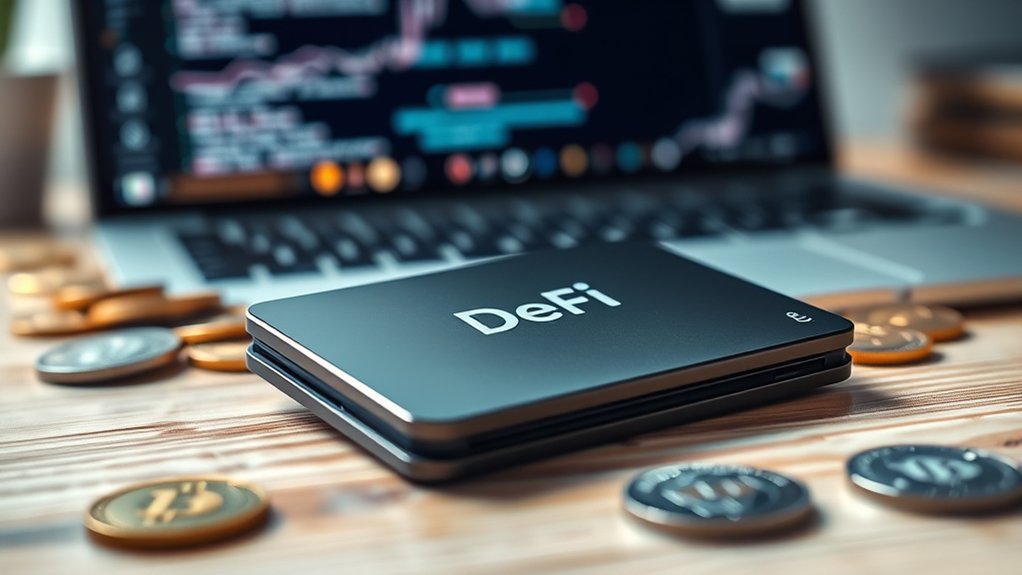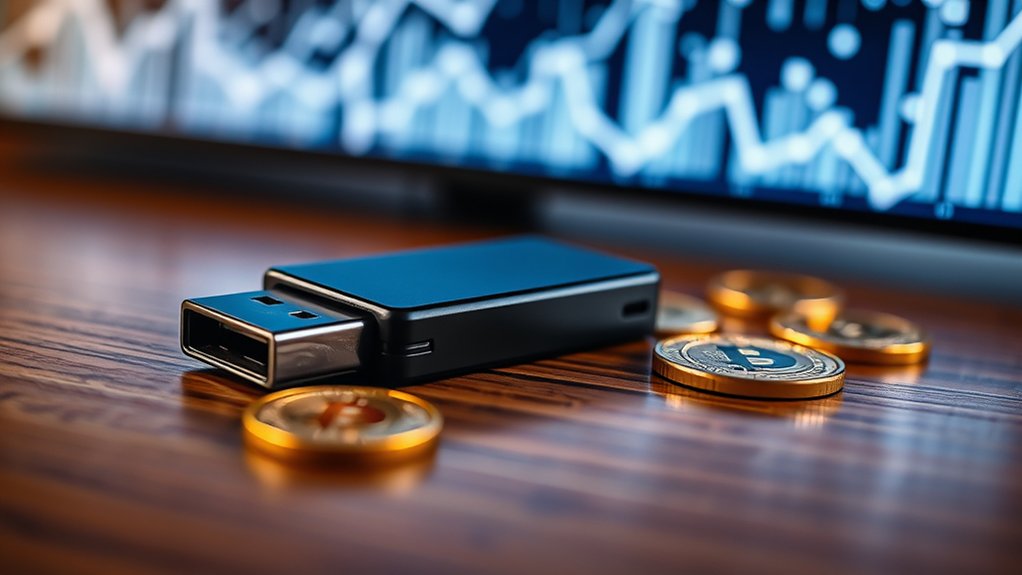A DeFi wallet is your digital key to the cryptocurrency world—no banks involved, just you and your assets. It allows you to manage and store crypto while interacting with decentralized finance. You hold the private keys, which means you’re responsible. Forget that seed phrase? Good luck recovering your funds! There are software and hardware options, each with perks. It’s a wild frontier—flexible but risky. Stick around for a deeper exploration into what makes these wallets tick.

In a world where financial freedom feels like a pipe dream for many, DeFi wallets have emerged as a beacon of hope—or at least a handy tool. These digital wonders allow users to store and manage cryptocurrencies without a middleman. That’s right, no banks, no brokers, just you and your coins. A DeFi wallet is your gateway to the decentralized finance universe, where you can lend, borrow, and even earn interest like you’re playing Monopoly, but in real life.
The magic lies in self-custody. Users control their private keys—no more handing over your hard-earned assets to some faceless corporation. Transactions are secured with cryptographic keys: a public key for receiving funds and a private key for sending them. It’s like having a secret handshake, but for your money. Additionally, DeFi wallets enable users to interact with decentralized applications (DApps), expanding their financial capabilities beyond mere storage, and they often include token swap features for exchanging assets without centralized exchanges. This capability is part of the broader DeFi ecosystem, which aims to provide innovative financial solutions.
Plus, everything is recorded on the blockchain, ensuring transparency. If one thing is certain, it’s that your transactions aren’t going anywhere; they’re etched in digital stone.
DeFi wallets come in various flavors, from software options like MetaMask and Trust Wallet to hardware giants like Ledger and Trezor. Each type offers its own perks. Mobile wallets are perfect for on-the-go users, while hardware wallets provide an extra layer of security by keeping your assets offline.
And let’s not forget about multi-chain support. You can hop between different blockchain networks like a kid on a sugar high.
But, here’s the kicker: with great power comes great responsibility. Users need to keep track of their seed phrases and passwords, or risk losing everything. No pressure, right?
And while some might find the lack of KYC verification invigorating, it also means you’re on your own when it comes to security.
Frequently Asked Questions
Can I Use a Defi Wallet for Traditional Currencies?
A DeFi wallet? Not your buddy for traditional currencies.
It’s all about crypto, baby! Think Bitcoin and Ethereum, not dollars or euros.
No fiat support here. You’ll need to convert your cash first, probably through a centralized exchange.
So, if you’re hoping to stash some cash in a DeFi wallet, you’ll be disappointed.
It’s like trying to fit a square peg in a round hole. Stick to crypto!
Are Defi Wallets Secure Against Hacks?
Are DeFi wallets secure against hacks? Well, that’s a loaded question. They promise security with private key management and encryption.
But let’s be real. Hacks happen. Smart contracts can be buggy; they’re like a ticking time bomb. Plus, users are fully responsible for their assets—no warm, fuzzy custodian here.
Sure, some wallets offer features to enhance safety, but precaution is key. Just don’t expect a magic shield. Security is a constant battle.
What Happens if I Lose My Wallet Keys?
If someone loses their wallet keys, it’s game over.
No magic recovery button. No friendly tech support. Just a void where funds used to be.
The recovery seed phrase? Yeah, that’s the only lifeline, and it better be typed in perfectly.
One wrong word, one misplaced letter, and poof—money gone forever.
It’s a harsh lesson in self-reliance. Store that seed phrase securely, or risk living with regret.
Tough luck, right?
Do Defi Wallets Support All Cryptocurrencies?
No, DeFi wallets don’t support every cryptocurrency out there.
It’s a mixed bag, really. Some wallets cater to specific chains, like Ethereum or Polygon. Others might only handle a handful of tokens.
Token swapping? Sure, that’s a thing, but not all wallets are created equal.
So, if you’re hoping for a one-stop-shop for all your crypto dreams, prepare for disappointment.
It’s a selective club, and not everyone gets in.
How Do I Transfer Assets to a Defi Wallet?
Transferring assets to a DeFi wallet? Easy, right? Not quite.
First, pick the right assets—make sure they’re wallet-friendly.
Set up the wallet properly; don’t mess that up.
Private keys? Guard those like a dragon with gold.
Check the wallet address—double-check! Who wants to lose crypto?
Understand the fees; they can sneak up on you.
Finally, sit tight and wait for that confirmation. It’s like watching paint dry, but necessary.





